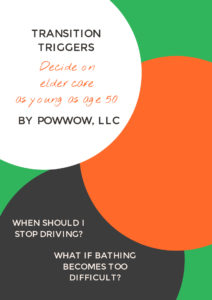I’m a big believer in discussing elder care with my clients as young as age 50.
I use this age as my starting point for a few reasons:
Get serious about living a healthier lifestyle. At 50 you’re still able to influence your long-term health through small adjustments to diet and exercise that will eventually minimize your risk of falling. Focus on improving muscle tone, balance and being well enough to stay below 4 medications. You have nearly a 100% risk of falling if you suffer in these three categories.
Make your financial stability a priority despite competing interests. It’s time to shift away from thinking there is plenty of time to “catch up.” Work with a planner to create reasonable expectations for retirement lifestyle choices.
Downsizing may be on the brain. With 55+ communities on the rise, it’s a good time to consider if moving is in your future and how it impacts your retirement and elder care plans. You may like to downsize to a 55+ community right away so you can enjoy the community for 20-25 years before needing a second transition to assisted living. Conversely, you may decide to downsize directly to a Continuing Care Retirement Community (CCRC) in your 70s so that you only have to move and coordinate care once.
It’s a good time to review estate plans. When children are minors guardianship is the primary concern, meaning important decision-making roles are delegated to parents, siblings, and friends. Once children become responsible adults, it may be time to shift these responsibilities to the next generation. It should also be easier to decide how and when beneficiaries should receive an inheritance, which may be different for each one.
Decision making related to transition is rooted in logic vs emotion. Writing down “transition triggers” at a younger age allows you to decide the when-and-whys for change. It also gives you the ability to name your own solution with plenty of time to budget in the expense of transition.
Its last call for reviewing insurance options. Premiums after age 60 start exponentially increasing making the cost of waiting very expensive. Additionally, the threat of an unexpected health crisis may remove your preferred health discount, if not disqualify you completely. Even if it’s not something you ultimately purchase, give yourself the option to make that decision rather than having it made for you.

